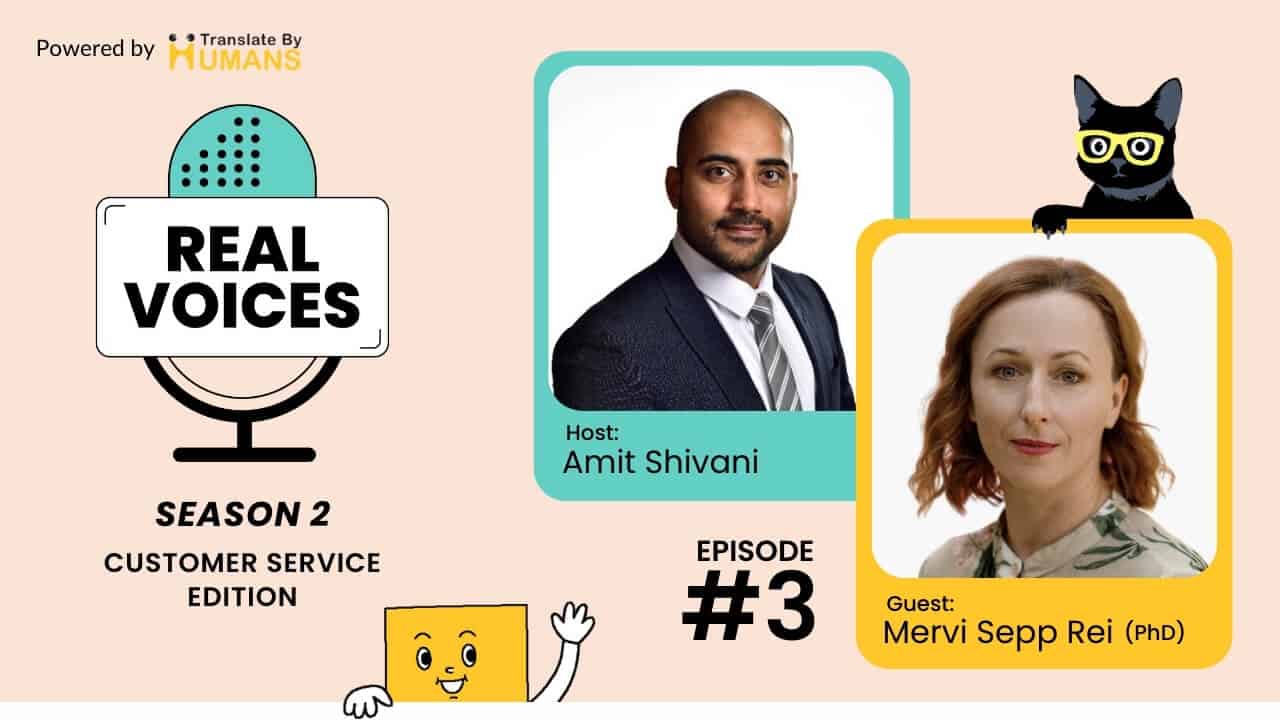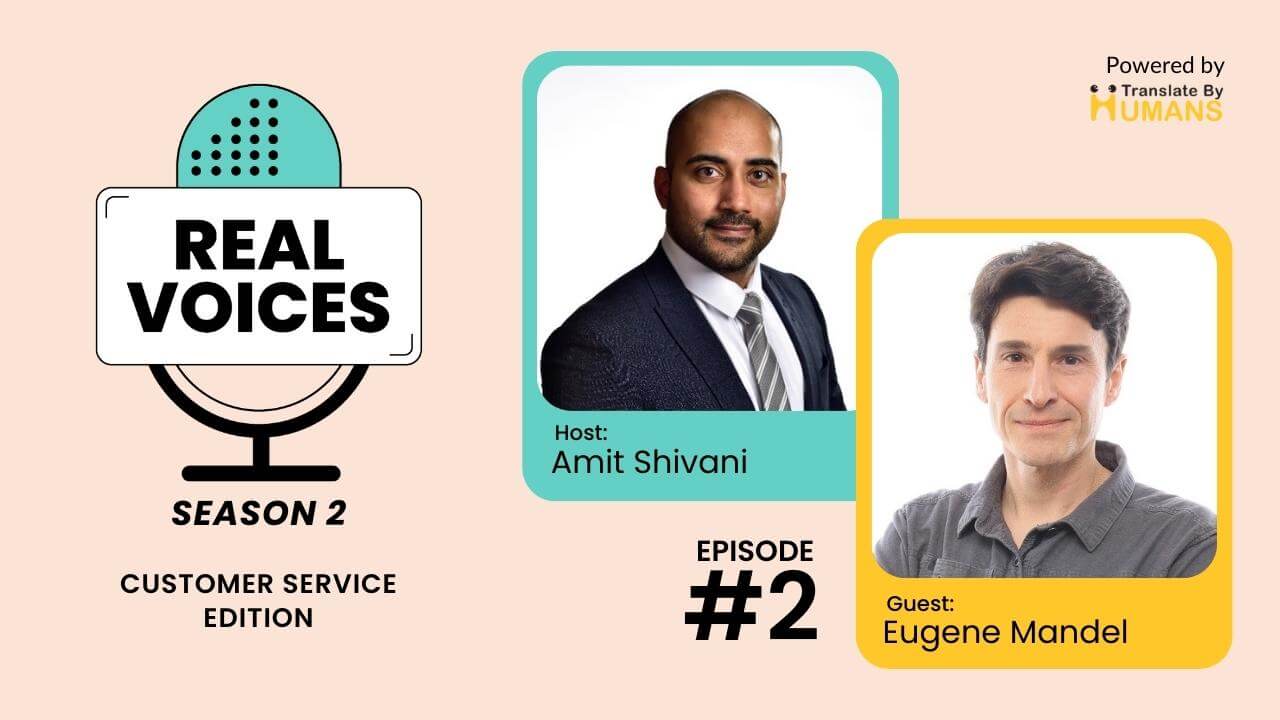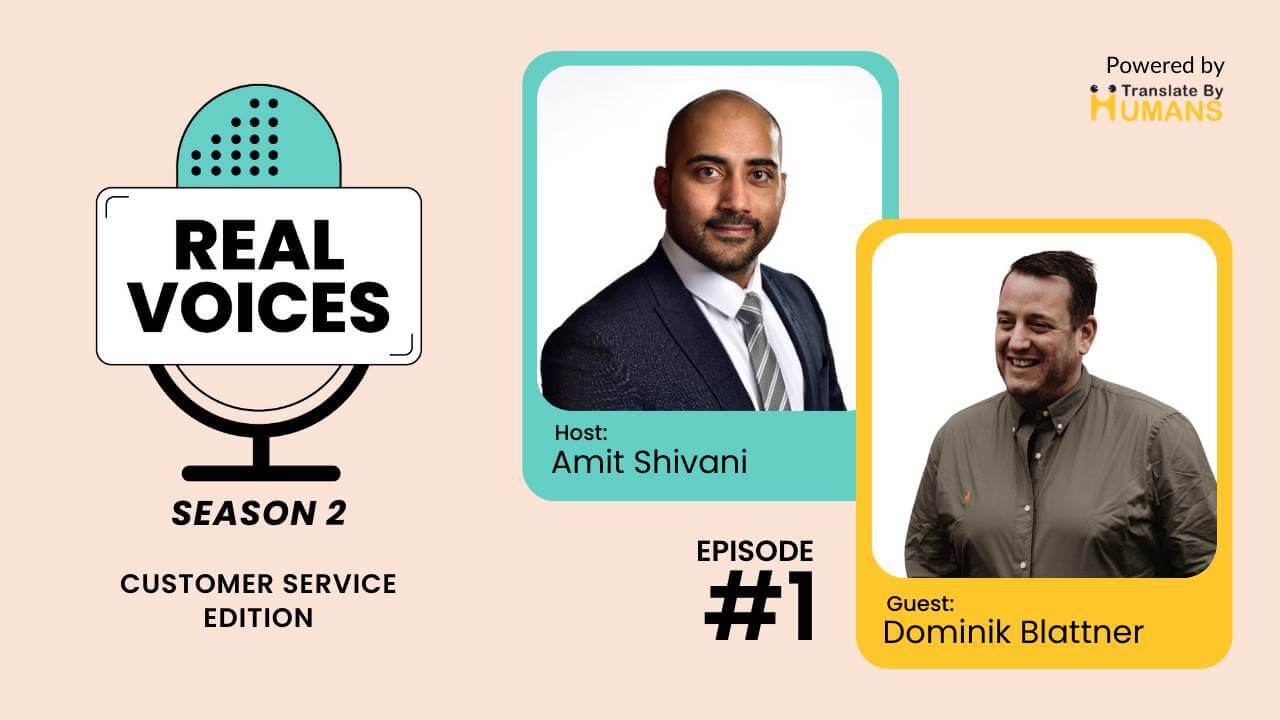Home » Real Voices » Why Loris.ai Is The Future of Customer Service? A Podcast With Eugene Mandel
Why Loris.ai Is The Future of Customer Service? A Podcast With Eugene Mandel
Listen on :
Our Guest

Eugene Mandel
Head of AI, Loris
Our Host

Amit Shivani
Director of Sales, Lingpad
In this riveting episode of “Real Voices – Customer Service Season 2,” we’re about to embark on a groundbreaking journey with a visionary guest. Eugene Mandel, Head of AI and the brilliant mind behind Loris.ai, is here to illuminate the thrilling transformation of the customer experience landscape. Loris provides customer insight and quality improvement across the entire CX lifecycle.
Join us for an exploration like no other with our host – Amit Shivani, Director of Sales at Lingpad. Let’s dive into a world where technology and human ingenuity unite to redefine customer service.
Key Takeaways:
Key Insights:
Let's start by talking about your background. Can you please share some information about yourself and how you initially became involved in AI?
I have a rich background in launching startups across various domains, spanning engineering, product management, and data science. Over the years, a common theme has consistently emerged: the synergy between humans and machines in the context of different industries. Mainly, my passion has revolved around how this collaboration can be centered around human language, which aligns closely with your expertise. Human language has always held a deep fascination for me.
I am currently amid my second venture in AI for Customer Experience (CX) at Loris, and I’m having unbelievable fun.
Could you share some insights about your background, and what advice would you offer to someone looking to embark on a career in the ever-growing field of AI?
It’s worth noting that my journey into AI began a while back, and the landscape has significantly evolved since then. Like all technologies, AI has its cycles of ups and downs. What’s different now is that it’s far more accessible. The abundance of open-source tools and commercial solutions for working with data is incomparable to what was available a decade ago, let alone two.
Here’s a key lesson I’ve learned and now consider a fundamental truth: Dive into the data. Spending time exploring, understanding, and experimenting with a dataset is almost always a valuable investment.
Let's talk a bit about Loris.ai. Tell us what Loris does, and who would find it useful.
Loris’s approach combines the power of conversational analytics and quality assurance to enhance customer experience. By identifying and analyzing common conversation “moves” in customer support, we bridge the gap between data and quality evaluation. This innovative fusion leverages advancements in natural language AI, allowing for a more comprehensive understanding of customer interactions. The goal is to automate and scale quality assurance processes while ensuring the right balance of human and machine involvement.
When integrating AI into customer service operations, is there a need for companies and managers to establish specific training programs for their agents to effectively utilize AI, or is it something that can be learned intuitively as they work? Managers often grapple with concerns about the duration and complexity of such training, especially when considering how it might affect new employees joining the team.
A great product shouldn’t need lengthy manuals, extended implementation periods, or special training. When evaluating AI-infused products for customer experience and support, this simplicity matters. Agents should seamlessly fit into their roles without constant skill switches. Quality assurance in analytics primarily serves CX and QA managers, with agents participating in coaching sessions. They receive real insights without altering their skill set. However, it’s crucial to note that this approach is current, and future customer support may demand a different perspective in about five to six years.
What will the structure and function of a Customer Experience (CX) or Customer Service (CS) organization likely be in the next five to six years?
In my opinion, based on industry insights and technological understanding, I foresee a significant shift in how humans and machines collaborate in customer service within the next five to six years. Rather than a clear-cut division between automated systems and human agents, I envision a dynamic blend. Conversations will typically start with automation and self-service, with human agents acting as AI supervisors. These agents will intervene when conversations become too complex or emotionally charged for machines to handle. They’ll also train the AI to improve its capabilities.
This shift means that organizations may require fewer agents, but these agents will need enhanced skills. They’ll remain experts in professional communication, but they’ll also need to be adept at analysis and training, elevating their subject matter expertise without requiring them to be engineers or data scientists.
In the current landscape, who would benefit from utilizing Loris.ai, and in what scenarios might it be beneficial? Specifically, which professionals or roles, such as managers or CX leaders, would find Loris.ai to be a valuable tool when they are brainstorming ideas or seeking solutions to problems?
So, there are a couple of use cases, I would like to mention two of them.
Use Case 1: Improving QA in Customer Experience (CX) Departments
Imagine you’re a CX leader with a QA department facing a common problem – you can only review a fraction of customer interactions. This leaves a lot hidden and makes it challenging to fairly grade agents. But here’s the solution: AI can help you gain insight into all conversations, be fairer to your agents, and generate valuable insights. With the right AI tools, you won’t need to hire more QA analysts. The AI offers a more efficient workflow and even brings automated QA into play. It focuses on three main areas: communication skills, product knowledge, and process verification. For effective communication, AI learns to assess agents’ professionalism by understanding specific questions. So, you’ll have a better way to evaluate your agents’ skills, starting with the beginning of a conversation and expanding from there.
Use Case 2: Actionable Insights for CX Leaders
As a CX leader, what you need are actionable insights, emphasis on the “actionable” part. You can leverage AI to understand what’s causing customer dissatisfaction. It provides you with concrete stories and actionable data. For instance, if customers are struggling with a specific task in your product, you’ll have the insights to make changes. You can create new scripts or policies, train your agents, and collaborate with other teams to address the problem. If, for example, customers can’t change their password, you can tell your product manager that implementing this feature could reduce support volume by 17%. AI-driven analytics empower you to take meaningful actions and improve the customer experience.
In the realm of quality assessment, whether you're a quality leader, manager, or agent, the question beckons: Can the human touch remain unbiased and consistent in analyzing quality? Does Loris hold the key to unwavering quality assessment, regardless of the team's size or the analyst's title?
Certainly, the work of analysts who review conversations for hours can be quite psychologically taxing. Similar to how judges might give harsher sentences before lunch when they’re hungry and irritable, QA analysts might also find their judgments less consistent after several hours of continuous work.
AI can level the playing field by staying impartial and not favoring those with good reputations, ensuring nothing important gets overlooked.
Absolutely, it’s crucial to remember that AI is a team effort between humans and machines. It’s not an AI working solo; people review and influence its decisions. When creating AI features, we should anticipate occasional mistakes and design the ability for users to challenge and correct those judgments, shaping future AI decisions.
Can Loris.ai be a game-changer for companies with high volume and limited quality control resources? Can it help these organizations optimize their existing teams for quality checks before rushing into recruitment?
Certainly! Embrace the power of CX (Customer Experience) departments, as they play a pivotal role in engaging with your most valuable asset – the customers. Despite sometimes feeling overshadowed by other executives like the CFO, CTO, and CEO, CX leaders hold a unique and crucial position. You can leverage Loris as your secret weapon to provide exclusive insights into customer behaviour, influencing product development and financial strategies. Doing so can raise your profile and showcase the indispensable value you bring to the company.
What are the key hurdles and considerations individuals or businesses should keep in mind when embarking on an AI-driven quality assessment journey, rather than simply choosing a product?
Navigating the world of AI products as a buyer can be overwhelming due to the abundance of choices and often similar-sounding claims. It’s essential to take what companies say with a grain of salt, not because they intend to deceive but because they’re naturally passionate about their solutions. To mitigate risks, prioritize getting to demos and testing on your data as quickly as possible.
Beware of over-the-top promises that AI will magically solve all your problems. When you hear extreme claims, consider it a warning sign. Lastly, be mindful of implementation costs, which vary significantly between products. Gathering all this information during the sales process is crucial for any buyer.
Certainly! I'd like you to tell the audience more about the "Agent Copilot" feature on Loris.ai's website that caught my attention. Can you explain what it is and how it can benefit users?
Agent Copilot is not a chatbot but an assistive technology for customer service agents. It began with Lori’s idea to help agents during chats and emails. This browser extension observes and analyzes what customers and agents are saying, gauges sentiment and intent, and suggests responses to the agent. The agent can accept the suggestions, make partial edits, or reject them altogether. This tool lightens the cognitive load on agents, enabling them to work more efficiently. Copilot has been in development for over two to three years, and recently, there has been a surge in similar assistive technologies thanks to advances in generative AI.
Okay, so is it a tool that can help customer service agents be more proactive and confident in their responses by providing recommendations and assurance in real-time during conversations?
Absolutely! It’s like having an AI assistant that lightens the mental load, boosting your confidence. When you see a suggestion and think, “I would have said that,” it helps you say it faster and more assuredly. Generative AI technologies often follow this pattern, assisting you in crafting content, like drafting emails, blog posts, or ads. You retain control over the content, making the final call on correctness, but the AI streamlines the process, making it more effortless.
Why do many people remain apprehensive and fearful of AI, often envisioning doomsday scenarios like Skynet from Hollywood movies?
AI straddles the boundary between reality and science fiction, blurring the lines between human and machine. It’s sometimes hard to distinguish between your ideas and AI-generated content. While some fears about AI are valid, I work with language AI, and its potential impact on misinformation, disinformation, and social media is a cause for genuine concern, not just fear.
Don't fear technology; instead, welcome it. Remember, you're always the one in control, and it won't completely take over your life.
An excellent AI product should be like a self-driving car with a steering wheel you can touch if needed. It’s about giving users control and not letting AI take over completely. Remember the Microsoft Chatbot disaster? Deploying AI without user oversight in customer experience would be a big mistake.
The customer service landscape is evolving, and Loris.ai is at the forefront of this revolution. As Eugene Mandel explains, the synergy between humans and AI is vital to achieving remarkable customer experiences. It’s time to embrace AI, break down the barriers of fear, and unlock the potential of technology.
With Loris.ai, you’re not just improving quality; you’re shaping the future of customer service. Don’t miss this transformative journey—get in touch with Loris.ai and be part of the AI-powered customer service revolution! They’ve got just what you need!
Share this video:



